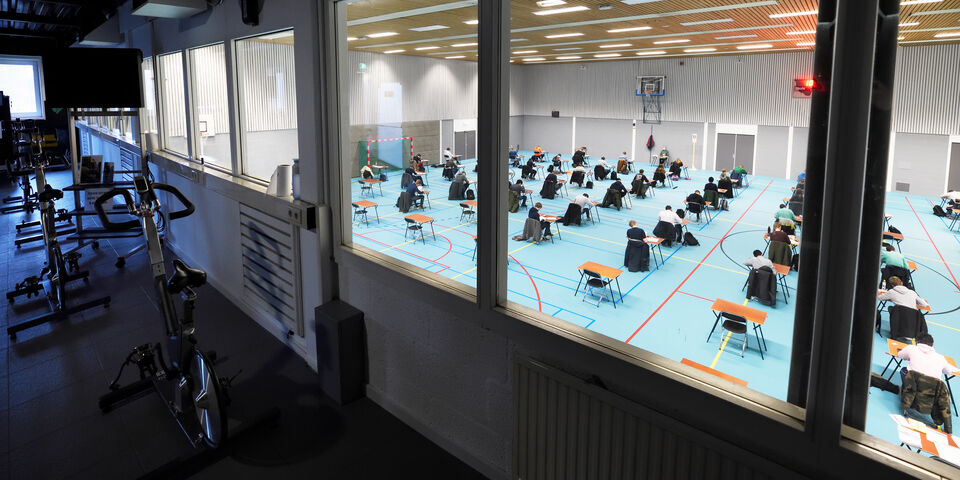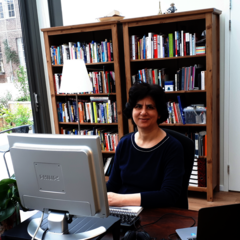Examination organization ready for new measures, curfew won’t pose problems
What does it take to organize exams for thirteen thousand students? It’s quite a challenge even under normal circumstances, let alone in a situation where the government implements new corona measures with hardly a day’s notice. Incidentally, it became clear this afternoon that the night curfew, should it be implemented, will not pose any problems to students who have to take their exams in the evening.
The question of how things stand with the organization of the exams will be answered in a radically different way on Thursday afternoon, January 21 than on any other day prior to March 2020. The usual answer would be: ‘The exam schedule was definitively determined on August 1, and exam coordinator Ron Tempelaars will work out the final details two weeks prior to an exam period.’ Now, the answer is: “I’m constantly keeping an eye on the parliamentary debate in the House of Representatives. We’re still kept in suspense as we await the parliament’s decision on a night curfew.” We are speaking with Ouafae El Fahmi, chain manager Exams and Fraud at TU/e. “It’s a reflection of the situation we find ourselves in,” she says. “Just when we think that we have all our affairs in order, a new measure is introduced halfway through the exam period. A night curfew means that we will have to offer 1250 students alternative forms of examination.”
However, it became apparent this afternoon that the nigh curfew will not lead to any problems for students who have to take their exams in the evening. The General Union of Educational Personnel (AOb) quoted minister Ferdinand Grapperhaus on its website. The minister took responsibility for the confusion that arose yesterday evening concerning the curfew. The cabinet’s draft version of the proposal for the curfew included an exception for students travelling to take an exam, but this passage was later withdrawn. Grapperhaus: “We hadn’t yet properly considered the proportionality of this measure. We learned that there were some problems within higher education. Officials from two ministries worked until late in the evening yesterday, and the exception will apply.” This is confirmed by umbrella organization VSNU on its website.
Yes, you read it right, some 1250 students are scheduled to come to the campus in the evening during the second week of this exam period to take their exams. Most of these exams are resits. Teachers received an email on Wednesday informing them to make preparations so that next week’s exams can be held online.
“During this exam period, TU/e will administer 387 centrally organized exams; 112 of these will take place on campus (29 percent) and 50 are hybrid (13 percent),” director Patrick Groothuis of Education & Student Affairs (ESA) said earlier.
El Fahmi is currently dealing with the fifth exam period since the outbreak of COVID-19. She has been working at TU/e since 1997, and the Aerospace Engineering graduate obviously didn’t see this coming, although she can almost laugh about it. “Examination organization is like rocket science these days.” Her slogan: Try to remain calm.
Looking back
There was panic during the first corona-afflicted exam period in April of last year. “We had to switch to online exams unexpectedly and at short notice.” Two months later in June, Q4, there was some experience to draw from, and some improvements were made. “We were familiar with the processes.” The third exam period was the so-called interim, when students could take resits during the summer break. El Fahmi: “We introduced the hybrid exams during this period.” The examination organization preferred, and still prefers, alternative forms of testing knowledge, incidentally.
“We had the opportunity during Q1 of this academic year to organize part of the exams on the campus, and we were ready to switch in case a new lockdown was announced,” El Fahmi says. The ministry announced additional restrictions in November, but these did not apply to higher education. “We started in the same fashion as before this time around, but now we’re faced with the prospect of a night curfew.”
El Fahmi keeps a cool head and has a good back-up plan in place. “We don’t feel any stress at the moment. We’re prepared for the worst. Over fifty employees are on standby once again, and we remain calm. There’s nothing worse than making mistakes in communication due to stress.”
Opt-out
TU/e offers students the possibility of taking a paper exam on the campus instead of an online exam at home. They need to request an opt-out for this.
Robbie Oerlemans, Educational activities planning at ESA, normally concerns himself with monitoring, analyzing and predicting the capacity of TU/e’s teaching rooms. However, since the coronavirus outbreak, his main field of activity lies in determining the impact of the government’s measures on the way in which the university organizes exams. How many students are allowed on the campus per half-day, and will it fit?
TU/e offers its students the possibility of an opt-out for exams that are administered using online proctoring. For this current exam period, 47 students requested such an opt-out for 68 exams. In a few cases, the teacher responsible for administering the exam changed the form of examination after the request was submitted. Not because of the request, but because the number of students participating in the exams was so low that it was possible for the teacher to find an alternative form of examination. Oerlemans set off to work in Q2 for forty students.
Turning an online exam into a paper exam using the system ANS Delft is relatively easy, but it still requires extra effort from teachers and members from the auxiliary staff. And a teacher sometimes needs to write an exam by him or herself. In both cases, the exam needs to be uploaded to Surfdrive. ESA can download the exam, print it out, put it in an envelope and include an instruction paper for the invigilators, keep it in a secured cabinet, and make sure that it arrives at the right location at the right time. All the opt-out students are present, whenever possible, in the same room.
No one is required to explain why they requested an opt-out. Oerlemans can understand that. “If online proctoring really makes you feel uncomfortable, you’re allowed to make use of the offer, that’s what it is for.” He has a tip for students: “You can also book a room via Book to take your online exam on the campus in a quiet surrounding with a reliable Wi-Fi connection.” He can’t say how many students make use of that option; the booking system doesn’t indicate whether the request is for studying or for performing.
Yet another solution
Yet another solution needs to be found for students when the night curfew takes effect (which turns out not to be an issue, but this wasn’t clear yet at the time of this interview, ed.). That will mean having to come up with customized solutions, El Fahmi says, because TU/e will not compel students to take proctorio exams. In extreme cases, the examination committee will look into the situation. “It’s important that we clearly communicate about this with the students and teachers involved. They will receive personal emails.”
El Fahmi senses a certain corona measures fatigue, which is why she once again asks people to show understanding for all those involved. “Students, teachers, organizers, auxiliary staff members, external invigilators, it’s difficult for everyone, and everyone works hard to make sure that the primary process, education, can continue to take place.”




Discussion